#Italian Fashion History
Explore tagged Tumblr posts
Text
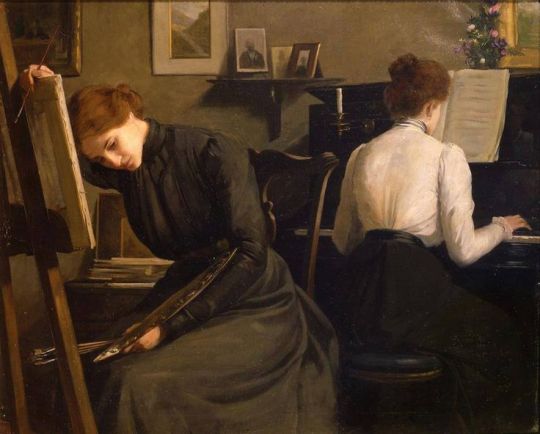
The Painter and Pianist
Lionello Balestrieri
#Lionello Balestrieri#italian art#girl time#the girls#musician#art#painting#art history#fashion#portrait
13K notes
·
View notes
Text




Late Victorian and Edwardian fashion in portraits by Giovanni Boldini (Italian, 1842-1931)
#these gowns are stunning#art#Giovanni Boldini#fashion history#paintings#art history#art detail#painting detail#women in art#classical art#painting#Edwardian era#1900s fashion#1900s art#italian art#paintings set#dark academia art#light academia#illustration#art on tumblr#20th century art#historical dress#historical fashion#Victorian art#victorian fashion
13K notes
·
View notes
Text

White Muslin Round Gown, Italian, 1795
From the Kyoto Costume Institute
284 notes
·
View notes
Text

Portrait of a dandy (painter Henri de Toulouse-Lautrec) (c. 1890) by Giovanni Boldini. Norton Simon Museum.
#giovanni boldini#norton simon museum#19th century art#late 19th century#19th century#1890s#italian art#italian artist#paris#europe#oil painting#painting#artwork#kunstwerk#kunst#art#history of art#art history#belle epoque#fashion history#fashion of the 1900s#1890s fashion#france#french#third french republic#third republic#parisian style#history of fashion#toulouse lautrec#henri de toulouse lautrec
171 notes
·
View notes
Text
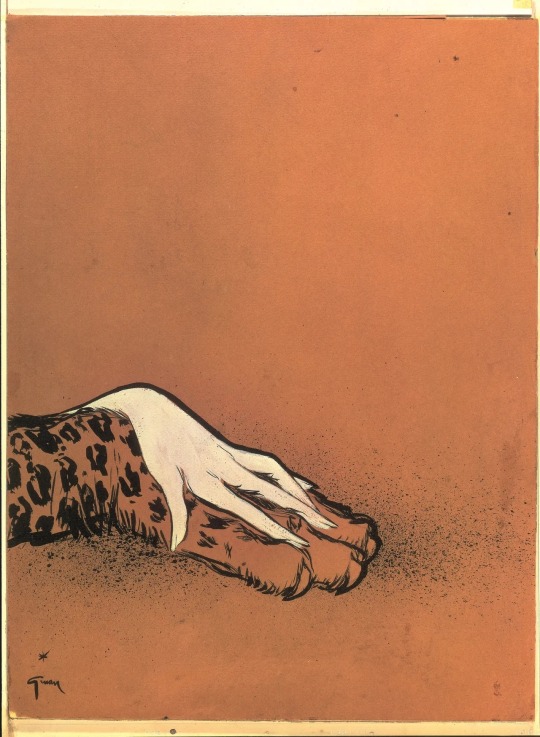
René Gruau
Advertising illustration for Miss Dior (Collection of Parfums)
Christian Dior, Paris, 1949
#rene gruau#french fashion#fashion#fashion illustration#fashion illustrator#fashion design#haute couture#couture#french art#italian artist#italian painter#magazine illustration#illustration#modern art#art history#aesthetic#beauty#tumblr art#tumblrstyle#tumblrpic#tumblrpictures#tumblraesthetic#aesthetictumblr
576 notes
·
View notes
Text

Curiosity (1892) by Eugene de Blaas
#eugene de blaas#victorian era#academic art#academicism#genre painting#genre scene#academic classicism#1890s#19th century#late 19th century art#italian art#fashion history#art#painting#art history#💮💮
929 notes
·
View notes
Text

Mario Reviglione (Italian, 1883-1965) • Portrait in black of Mrs. Levi Muzzani • 1916
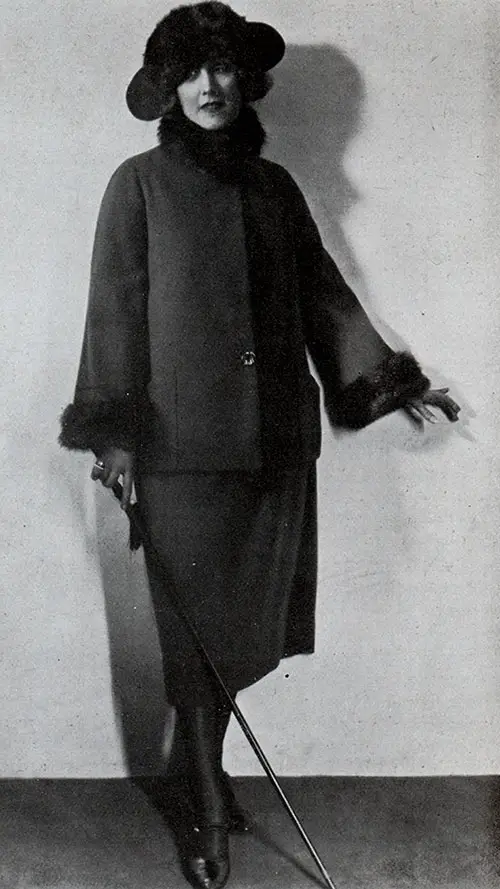
Fur was everywhere in the 20s. Both men and women were resplendent in fur. Fur-trimmed collars and cuffs adorned coats and jackets. Full-length all-fur coats of mink or sable were only affordable to the upper classes. People of lesser means made do with squirel or beaver.
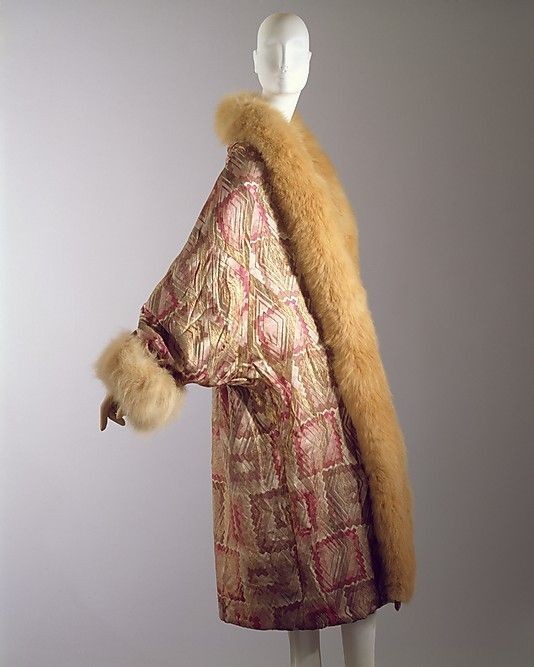
Lord & Taylor silk coat, lined with fox fur • 1920s
Wrap coats such as the one above were very popular, both for day and evening. It's not clear if the one above was meant to be worn as an evening coat but I suspect it was.
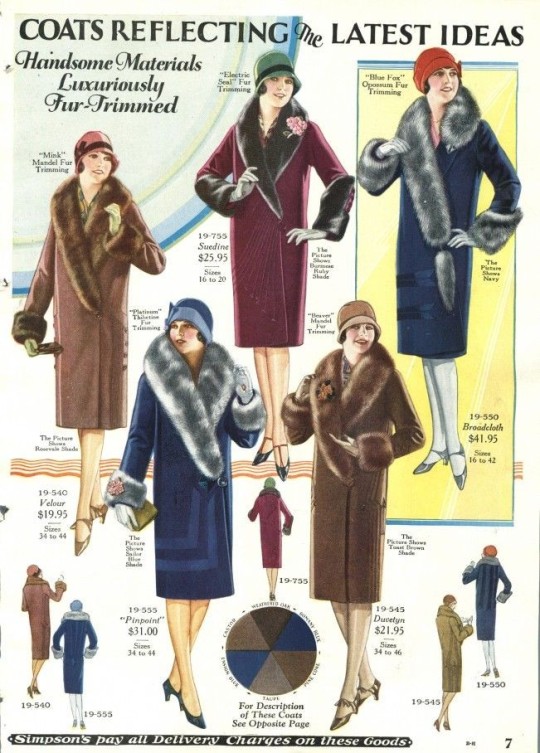
These fashion plate examples are more accurate examples of fir-trimmed coats worn in daytime.
Fur was popular in previous eras of fashion history as well. And, of course, remained popular for many decades to come. Thankfully, this trend was called to attention in the 1980s for its unnecessary cruelty.
#art#fashion history#art history#painting#portrait#fine art#1920s fashion#the resplendent outfit blog#fur fashion#1920s coats#women's fashion history#roaring 20s#fashion plate#mario reviglione#italian artist#oil painting#1920s photos
234 notes
·
View notes
Text

Brooch
19th century, Italy
Silver set with diamonds, rubies and emerald, with gold embellishments
Victoria and Albert Museum
#brooch#Italian#19th century#fashion history#antique jewellery#antique jewelry#jewelry#jewellery#frostedmagnolias
117 notes
·
View notes
Text
Beetlejuice's Backstory and the Black Plague 💚🕷️🥀💀 PART 3
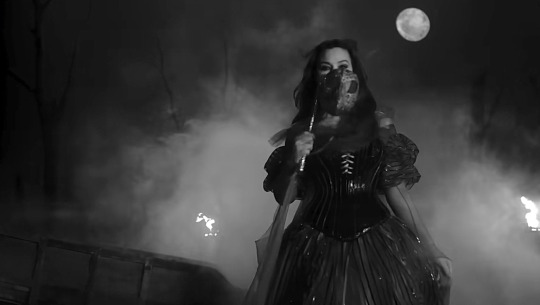
Good evening! As promised, here’s Part 3 of my series on Beetlejuice’s past and movieverse. Today, we dive deeper into historical fashion, analyzing the outfits of Beetlejuice and Delores to uncover their personal stories.
If you missed the earlier parts, check out PART 1 and PART 2.
Warning: This post contains SPOILERS for ‘Beetlejuice Beetlejuice’ (2024)... and many, MANY speculations.
Quick recap: In Part 1, we discussed the Plague. In Part 2, we delved into Beetlejuice’s past, questioning the claim that he died over 600 years ago.
I wondered: is that really true? Why does his clothing reflect the Baroque style, then?
That's right! In Part 3, I confirm my previous point: there are several clues suggesting that Beetlejuice most likely lived during the Baroque era - a cultural movement that began in Rome at the end of the 16th century and faded around 1750. Here is the list of the clues I noticed:
The lace neckband around BJ's neck.
His three-piece wedding suit.
Delores off-the-shoulder neckline and puffed sleeves.
The bird masks used by Delores and the undertakers.
AliveBeetlejuice first outfit (when he's stealing from corpses): specifically, the pirate shirt and the type of shoes.
Keep in mind that most of these elements were revolutionary novelties of the 16th-17th century. Here is proof for every. single. one of them.
The Lace Cravat
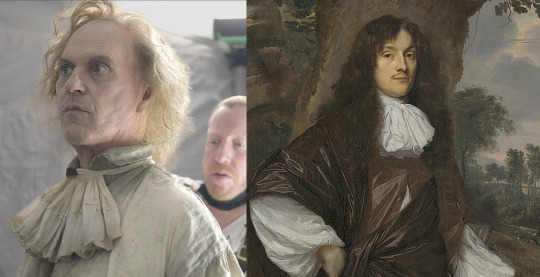
A behind the scenes still of Michael Keaton in 'Beetlejuice Beetlejuice' vs. the portrait of Jacob de Witte, Lord of Haamstede (Netherlands). The artwork was made by Jan Mijtens in 1660.
The first cravat, the predecessor of modern neckties and bow ties, originated in France during Louis XIV’s reign as a political and fashion statement. (Although the early idea comes from the Ancient Roman focale, used around 200 CE). The King was inspired by a particularly eye-catching necktie wore by Croatian mercenaries as part of their uniform. The new article of clothing quickly became a fashion staple for high-ranking men across Europe.
In its use, it represented the evolution of the common handkerchief, already popular in the 1500s as a practical tool, a flirty decoration, and a status symbol. I believe the variant Beetlejuice is wearing in the picture is called ‘jabot,’ and is one of the older, simpler versions.
Lace, often used in cravats, highlighted the wearer’s wealth. Italian lace, especially from Venice, was highly sought after by the European elite since the 15th century, when ruffs and collars were in vogue.
This detail suggests two possibilities:
Beetlejuice might have been an impoverished aristocrat (or a rich merchant) clinging to his title until the end. This could also explain the ring on his index finger, symbolizing power or family ties. Or both.
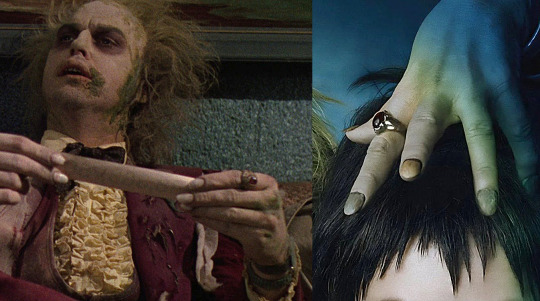
Alternatively, he may have been someone who strongly wished to be part of the elite.
Jacket and Breeches
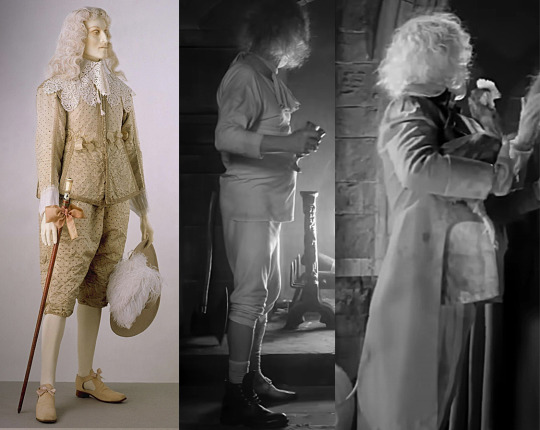
Aristocratic fashion, 1630 (Victoria & Albert collection) vs. What Beetlejuice wore in the wedding scene.
Another standout innovation of the Baroque period was the introduction of the three-piece men’s suit, known as the ‘Habit à la française.’
This ensemble included a tailcoat (a calf-length jacket), a coat (a long waistcoat), and knee-length breeches. Like the cravat, this fashion was adopted across Europe. As you can see, Beetlejuice is perfectly embodying this fashion, which evolved and remained popular until the 19th century. Interestingly, one shoe is missing.
Pirate Shirt
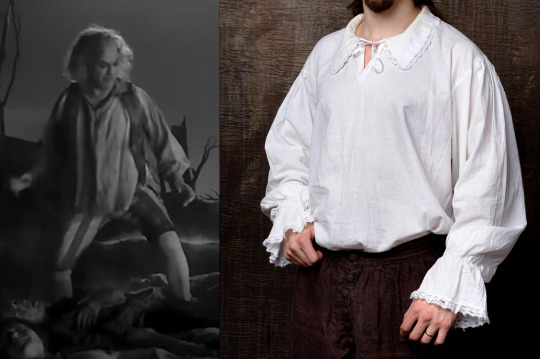
Originating in the 16th-17th century, the ‘poet shirt’ or ‘poet blouse’ remained popular through the Romantic era. These multi-purpose shirts served as both underwear and nightwear, featuring long tails that reached mid-thigh or knee. The body and sleeves were gathered at the collar and cuffs, creating a full, loose fit.
Delores' Outfit
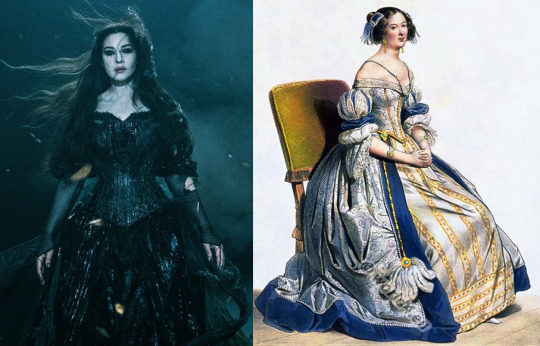
For comparison, I’ve included an illustration of noblewomen’s fashion at the court of Louis XIII (died 1643). His successor, Louis XIV, made France a cultural and fashion beacon for the next two centuries.
In the movie, Delores wears two nearly identical outfits: long dresses with puffed sleeves ending just below the elbow, a corset, and an off-the-shoulder neckline. This style aligns with 17th-century trends when fashion became more comfortable and relaxed.
The black color suits her character’s personality and role in the film, possibly hinting at a connection to the late Renaissance and the Spanish Court.
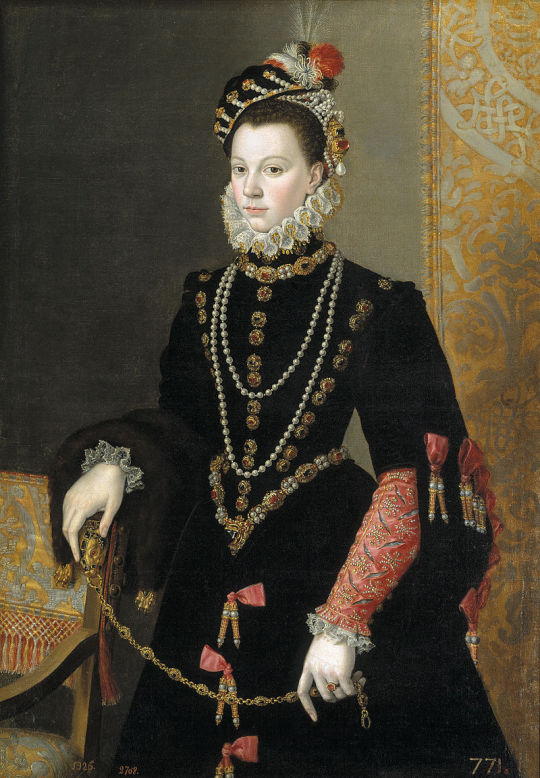
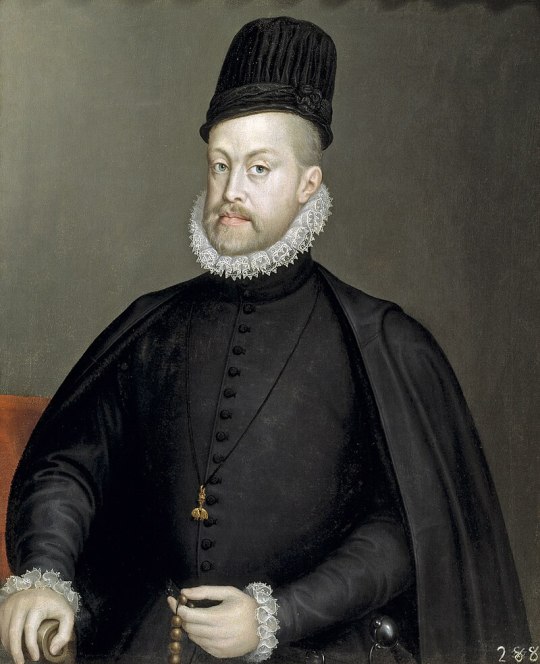
In fact, during the reign of Charles V (1500-1558) and his son Philip II (1527-1598), Spanish aristocracy particularly favored the black color, as it represented austerity and power for both men and women. Additionally, a deep shade of black was particularly difficult to achieve with the dyeing methods of the time, making those fabrics quite expensive to make.
However, The Spanish style was quite the opposite to what France later proposed: it consisted in a severe and somber luxury, which increased in opulence as the time passed. As Spain happened to be the beacon of fashion before Louis XIV came along, it's only natural that black rapidly became quite popular all around Europe as well. The color was particularly appreciated by the members of the middle class in Protestant nations and, apparently, in Italy as well.
Finally, keep in mind that 'Delores' is a variant of the more common 'Dolores'. Both names have Spanish origins and means 'sorrows'.
So what do we think? Was Beetlejuice from a rich family? Was Delores a Spanish witch?
Who knows! But I’m willing to dream and speculate!
Until the big reveal from Tim Burton himself in the now teased but not confirmed yet sequel, have a fantastic week!✨
#beetlejuice movie#tim burton#michael keaton#film theory#film analysis#film stills#cinema#film#movie#beetlejuice#betelgeuse#beetlejuice sequel#beetlejuice beetlejuice#europe#italy#beetlebabes#italian#dark#plaguecore#baroque#17th century#history#renaissance#historical fashion#delores#beetlejuice 2024#black plague#beetlejuice 2#beetlejuice & lydia
47 notes
·
View notes
Text

Gloria Guida
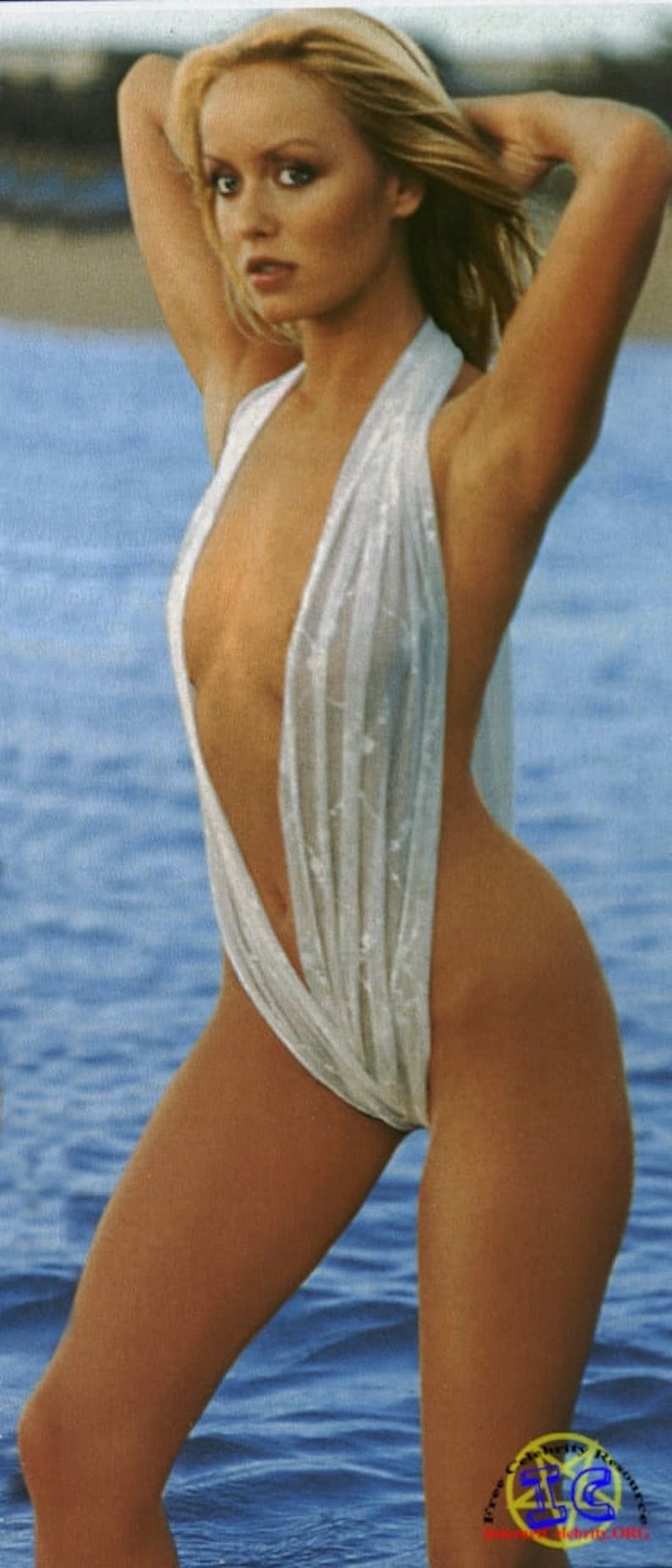
Gloria Guida
#classic#retro#vintage#vintage woman#beautiful#actress#beauty#feminine beauty#timeless beauty#classic beauty#italian actress#gloria guida#1970s movies#1970s aesthetic#1970s fashion#1970s history#1970s#1970s model#1970s icons#1970s vintage#classic icon#icon#amazing beauty
357 notes
·
View notes
Text
Time Travel Question 55: Medievalish and Earlier
If you could travel through time, but only to see something for Research or for Fun, not to change anything, what would you pick? Yes, you may have a Babel Fish in your ear to translate.
These Questions are the result of suggestions a the previous iteration. This category may include suggestions made too late to fall into the correct earlier time grouping. In some cases a culture lasted a really long time and I grouped them by whether it was likely the later or earlier grouping made the most sense with the information I had.
Please add new suggestions below if you have them for future consideration. All cultures and time periods welcome.
#Time Travel#Middle Ages#Basilica of Saint Francis of Assisi#Art History#Italian History#Cimabue#Giotto#Simone Martini#Pietro Lorenzetti#Pietro Cavallini#lithophones#History of Music#Homins#Prehistory#Minoans#mythology#Minoan mythology#Ancient Greece#Ancient Rome#Roman Religion#Ötzi#Ötzi the Ice Man#Neanderthal#Neanderthals#Fashion History#Folklore#History of Food
85 notes
·
View notes
Text

Young Woman Reading, 1875 Lucius Rossi
2K notes
·
View notes
Text
Only honest answers. Open to anyone who -good for them - isn't it*lian, still any it*lian could spam it.
Other suggestions are welcomed on the tags, if someone is indecisive can put the various choices on the tags.
#italy tag#italian history#fashion#italian fashion#design#sanremo#sanremo 2024#ferrari#ancient rome#commedia dell'arte#opera#italodisco#italodance#mediterranean sea#vatican#pope#operablr#theatre#baroque#renaissance#italian music
156 notes
·
View notes
Photo
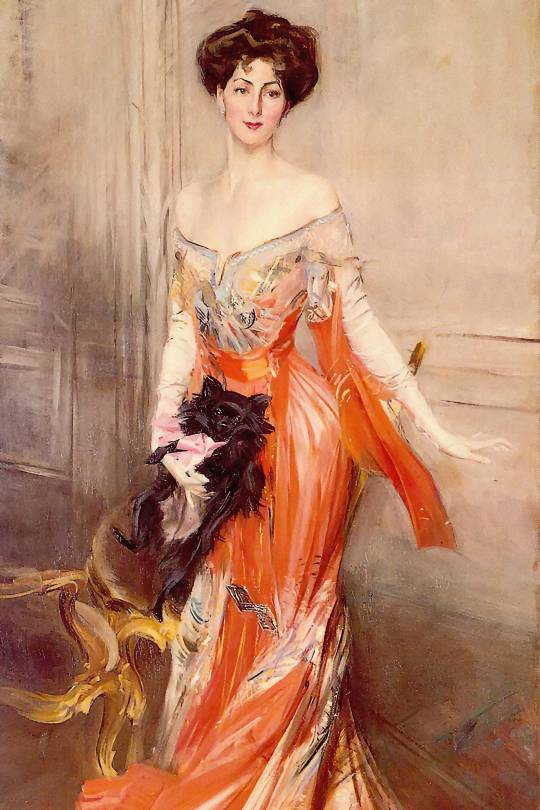
Giovanni Boldini (Italian, 1842–1931) Portrait of Elizabeth Wharton Drexel, c. 1905 Oil on canvas
#Portrait of Elizabeth Wharton Drexel#Art#Giovanni Boldini#Italian artist#portraiture#art history#history of fashion#edwardian era#artedit#madame
1K notes
·
View notes
Text

Portrait of a Lady (Dama in Rosso, believed to depict Countess Lucia Albani Avogadro) (c. 1560) by Giovanni Battista Moroni. National Gallery.
#giovanni battista moroni#national gallery#oil on canvas#oil painting#painting#artwork#art history#16th century#16th century art#1560s#art#women in art#female portrait#portraiture#history of art#portrait#porträt#kunst#kunstwerk#italian artist#italian art#italian painter#europe#italy#cinquecento#renaissance#renaissance art#italian renaissance#16th century fashion#history of fashion
30 notes
·
View notes
Text
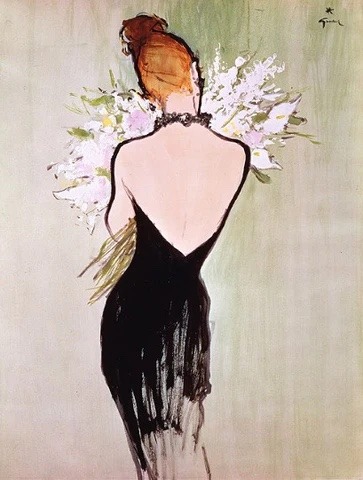

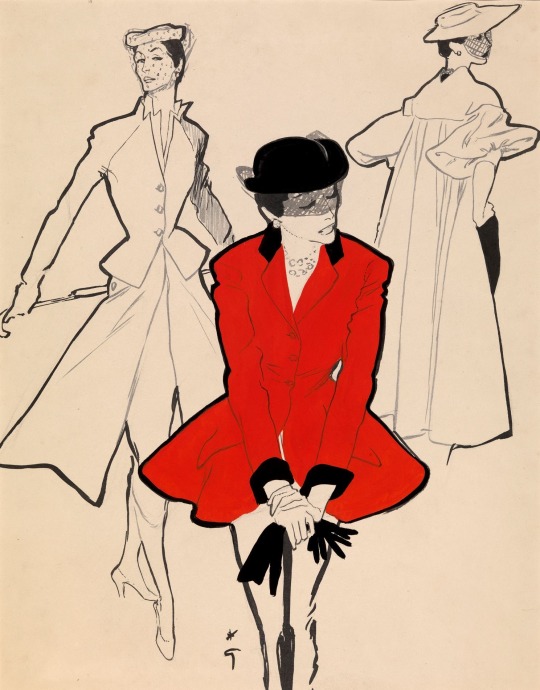
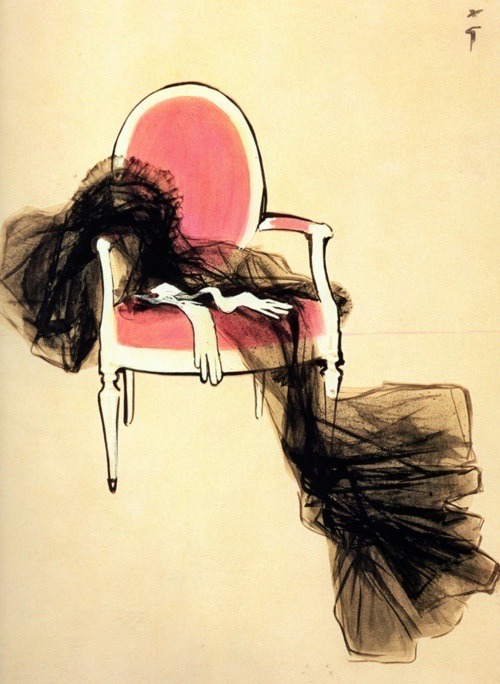
René Gruau Illustrations
#rene gruau#french fashion#fashion illustrator#fashion illustration#fashion design#fashion art#haute couture#couture#french designer#italian artist#italian painter#art on tumblr#aesthetic#beauty#modern art#art history#tumblr art#tumblrstyle#tumblrpic#tumblrpictures#aesthetictumblr#tumblraesthetic
153 notes
·
View notes